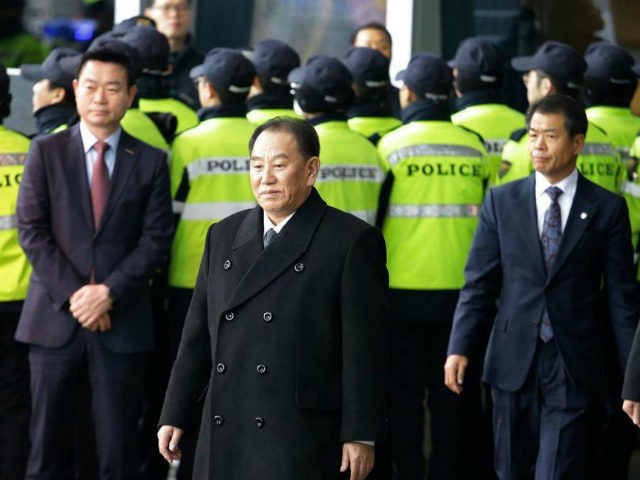Kim Yong-chol, a top North Korean official en route Tuesday to New York for meetings with American officials, stands accused of a litany of terrorist acts and holds a “Specially Designated Person” sanction from the U.S. Treasury, banning U.S. citizens from business with him.
His alleged involvement in the killing of dozens of South Korean citizens and key cyberattacks against the West led to South Korean conservative politicians’ branding him a “demonic war criminal” and protesting his presence at the PyeongChang Winter Olympics this February.
President Donald Trump confirmed that Kim Yong-chol is traveling to New York from Beijing on Tuesday, writing on Twitter, “Meetings are currently taking place concerning Summit, and more. Kim Young Chol, the Vice Chairman of North Korea, heading now to New York. Solid response to my letter, thank you!”
President Trump wrote a letter to communist dictator Kim Jong-un, published Thursday, announcing that a planned summit between the two, scheduled for June 12 in Singapore, would be canceled due to “the tremendous anger and open hostility displayed in your most recent statement.”
North Korea’s state media had recently disparaged National Security Adviser John Bolton and Vice President Mike Pence as well as not sending officials to a planned logistical meeting in anticipation of the summit. North Korea responded to Trump’s letter with a conciliatory statement from its Foreign Ministry stating that Kim was still open to meeting, which prompted a frantic second round of talks among American, South Korean, and North Korean officials seeking to ensure the meeting takes place on time.
Sending Kim to New York – where the United Nations is located, avoiding setting foot on as much legal American soil as possible – is reportedly part of these plans. Kim, a former spy chief who now carries the title of vice chairman of the Central Committee of the North’s ruling Workers’ Party, is expected to meet with senior American officials, including Secretary of State Mike Pompeo, according to South Korea’s JoongAng Ilbo.
As of Tuesday, Kim Yong-chol appears on the list of “Specially Designated Persons” curated by the U.S. Treasury’s Office of Foreign Assets Control. The Treasury explains that these individuals’ “assets are blocked and U.S. persons are generally prohibited from dealing with them.” Washington deemed Kim’s management of Pyongyang’s intelligence operations in 2010 “an unusual and extraordinary threat to the national security, foreign policy, and economy of the United States.”
Neither President Trump nor the White House has clarified how Kim will be legally allowed to engage with senior American officials without being arrested or deported, though this may be the reason why. According to South Korean news service Yonhap, he was initially reported to have booked a flight to Washington, DC, but changed his route to New York.
Kim made his largest diplomatic debut ever in February when he attended the Winter Olympics in South Korea. South Korean conservatives widely panned his presence in the country as an insult to the victims of North Korean terrorist attacks throughout the years, many of which occurred while Kim Yong-chol was running Pyongyang’s intelligence operations.
“Kim Yong Chol is a diabolical war criminal who attacked the South,” the parliamentary Floor leader of South Korea’s conservative Liberty Korea Party, Kim Sung-tae, said at the time. “He deserves death by hanging in the street.”
Yonhap reported that 70 lawmakers belonging to the Party protested Kim’s presence in the country in front of Seoul’s Blue House, the presidential palace, outraged that leftist President Moon Jae-in had allowed senior North Korean officials into the country.
South Korean investigations have found Kim responsible for a number of deadly terrorist attacks, among them the sinking of the Cheonan, a South Korean navy ship. Pyongyang denies reports that Kim ordered the torpedoing of the ship, which killed 46 people, in 2010, but has not presented evidence refuting Seoul’s findings. That same year, Kim reportedly ordered North Korean soldiers to shell the South Korean island Yeonpyeongdo, which killed four people, and to place landmines on the demilitarized zone (DMZ), injuring two South Korean soldiers.
Kim Yong-chol also ordered the assassination of Hwang Jang-yop, a former secretary of North Korea’s communist Workers’ Party who defected to the south. Hwang survived, and two of Kim’s officers reportedly received ten-year sentences for attempting to kill him after telling the South Korean court that Kim Yong-chol had ordered their murder plot.

COMMENTS
Please let us know if you're having issues with commenting.